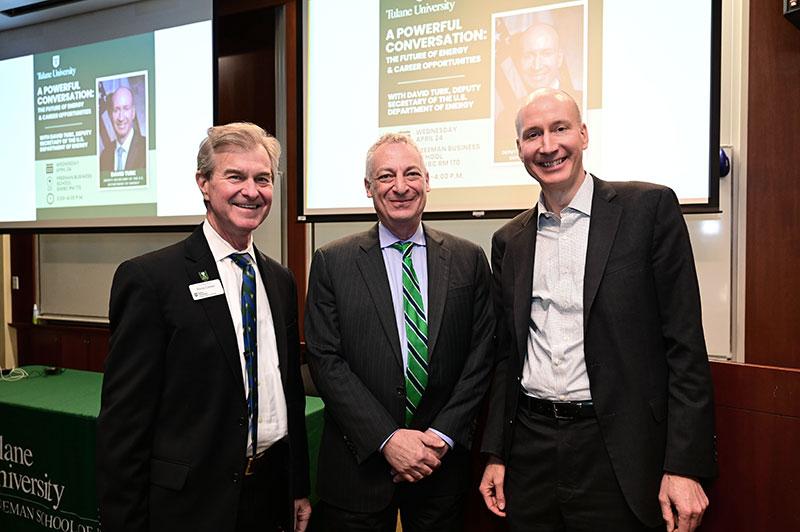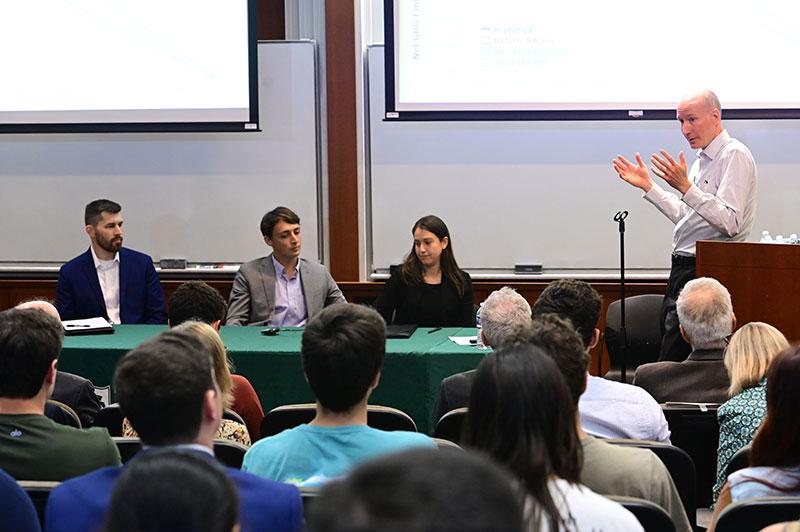Deputy Energy Secretary David Turk hosts fireside chat with students

David M. Turk, Deputy Secretary of the U.S. Department of Energy, visited the A. B. Freeman School of Business on Wednesday, April 24, for a fireside chat with students about energy policy, technologies and opportunities. The discusssion took place before a standing-room-only audience in the Goldring/Woldenberg Business Complex.
Sworn in as deputy secretary in 2021, Turk is the number two official and chief operating officer of the department, a $50 billion per year organization focused on energy, basic science and nuclear security. In his current role, Turk has taken a lead role in implementing President Biden’s historic clean energy legislation, including coordinating with the White House, interagency partners and the private sector.
The visit was coordinated by the Tulane Energy Institute, a center of excellence within the Freeman School that trains undergraduate and graduate students on the integration of energy markets, policies, technologies, and the environment, and pursues cutting-edge research that drives vital change.
“The Deputy Secretary’s focus on the energy transition underscores the importance of this topic for Louisiana, the nation and the world,” said Pierre Conner, executive director of the institute. “Effectively managing the transition is a primary focus of our courses and programs, so this was wonderful opportunity for our students to meet one of the leading figures in energy policy and ask some really thoughtful questions.”

In a wide-ranging conversation with Tulane students Owen Harris (SSE ’26), J.W. Cornwell (MME ’25) and Eliana Winderman (MBA ’24, MME ’25), Turk discussed his role as deputy secretary and touched on topics including the Inflation Reduction Act’s impacts on energy, efforts to achieve net zero emissions by 2050 and opportunities for students interested in energy careers.
He also praised the Tulane Energy Institute and highlighted the importance of business skills in energy.
“[Finance] is probably the biggest skill set of the folks that we’ve hired,” he noted.
Most of Turk’s presentation was devoted to the Biden administration’s ambitious clean energy goals. Currently, only three of 50 critical technology areas identified by the International Energy Agency are on track to achieve the target of net zero by 2050 — solar PV, EVs and lighting — but Turk concluded his presentation on an optimistic note.
“That’s an awful lot of opportunity for people to step up — engineers, lawyers, people in finance, policy people running for office,” said Turk. “Personally, I love working in this field and the opportunity to do good in the world and be intellectually challenged, it’s just immense. So I hope you’ll think about that going forward and being part of what gets us [to net zero by 2050].”
Interested in advancing your education and/or career? Learn more about Freeman’s wide range of graduate and undergraduate programs. Find the right program for you.
Other Related Articles
- Politico: Trump administration moves closer to opening Venezuela to more US oil producers
- Alumna leverages Freeman network to land dream job at Entergy
- Alum brings rugby mindset to new consulting program
- AI-powered fund takes top prize in Aaron Selber Jr. Hedge Fund Course
- Keeping it cool: MBAs help Convention Center find its temperature sweet spot
- Investopedia: Rising Inflation and Slowing Growth Are Investors' Worst Nightmare
- Jobs fuel growth of MME program
- Tulane Energy Institute gets major gift from Templeton family, new name for Trading Center
